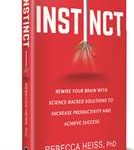Rebecca Heiss. Instinct. Citadel, 2021.

The title sounds like something Michael Crichton might have written, except that this book is nonfiction. I suspect Crichton would have liked it, though. It is subtitled Rewire Your Brain with Science-Backed Solution to Increase Productivity and Achieve Success. The subtitle sounds more like advertising than a description of the book. But the book is worth reading.
The author takes a look at certain human behaviors, ones that all of us can identify with. She takes a look at the instinctive or biologically inherited behaviors of people that once may have served a purpose for survival but nowadays tend to get us in trouble or make things more complicated.
Her discussion of sex, and even noting differences between the sexes, might be considered non-PC in academic circles, but most readers would probably identify with her descriptions. Or at least, most have witnessed such behaviors. Certainly, it is hard to imagine anyone really liking crude things some people do, but some of those crude things may be wired into us. That is not an excuse—let’s use a little self-control.
Other sparkling descriptions include our inherent appeal for variety. It was one thing when people were hunter-gatherers and happy to have a little variety in diet. Now when most of us are overwhelmed with choices, it can actually be stressful. We note that some retailers have understood this. Aldi, for example, does not stock the variety that most supermarkets do, but one can still get a pretty well balanced diet from them. Five Guys hamburgers are another example.
Another chapter is on accumulating information. Again, this used to be important for survival, but now we are on information overload. How do we begin to determine what is really important in the Information Age?
Probably the most telling chapter is the one on self-deception. We all use rationalizations to justify ourselves and make ourselves look better. She reminds us of a certain political figure whose wife died in a car accident. While the inquest determined she was at fault, he still blames it on another driver. Similarly, in my own experience, a few years ago I was stopped for speeding in a Southern state. I did not at the time think I was going over the limit, so I just assumed the policeman was handing out tickets to cars with Yankee license plates. Rationalizations all.
There are a couple of chapters on group identification, both identifying with one group and fear of those from a different group. Again, in tribal societies this may have been necessary for survival, but it creates more conflict in civilized places.
There is a touch of humor and understanding in this book. The author admits that these instincts are difficult to overcome. And sometimes they are harmless fun, such as when she tells us about being a Red Sox fan. The tribalism is in full view in Fenway Park, and it is OK in that context to “hate” anyone wearing a Yankees hat. We understand, of course, in conversation with any fan of an American League East baseball team except the Yankees, that New York team is commonly known as “they who must not be named.”
The author’s conclusion is entitled “Becoming Fearless.” How do we handle these things that we instinctively may see as fearful (the other, lack of variety, lack of information) or as being good (our own kind, our rationalizations)? It really comes down to two things: truth and self-control.
While the author does not write about religion and treats evolution as a fact, she does tell us that she was raised in the church. Truth and self-control are two key behaviors commanded in the Bible. Instead of instinct, the Bible speaks of the Fall and sin nature inherited from Adam, or the “natural man.” Whether we call it human nature or instinct, such things can get us into trouble. The Bible calls it sin. That is our natural inclination. We sin instinctively.
While the Bible’s ultimate solution to sin is salvation through Jesus Christ, how does the Bible tell us that we can tell the Lord is helping us overcome sin? Two of the things are truth and self-control.
Little children, let us not love in word or talk but in deed and in truth. By this we shall know that we are of the truth and reassure our heart before him; for whenever our heart condemns us, God is greater than our heart, and he knows everything. (I John 3:18-20)
For the grace of God has appeared, bringing salvation for all people, training us to renounce ungodliness and worldly passions, and to live self-controlled, upright, and godly lives…(Titus 2:11-12)
This is a secular book. Most of us on our own probably cannot exercise self-control over all our instincts. But the Holy Spirit is the Spirit of truth (see John 15:26) and self-control (II Timothy 1:7). With God’s help, we have a fighting chance. Our instinct, our natural personality, opposes these things. Dr. Heiss notes this, and so does the Bible (see I Corinthians 2:14).
Some of us may be able to control some of these things on our own, but why not take the next step and get divine help from the Holy Spirit? And get eternal salvation thrown in?
Instinct is worth reading. Its humor and timeliness may even make it a best seller. It is a good start. The Lord knows we all need to face truth and exercise self-control. As Sam Cooke sang, What a wonderful world it would be.